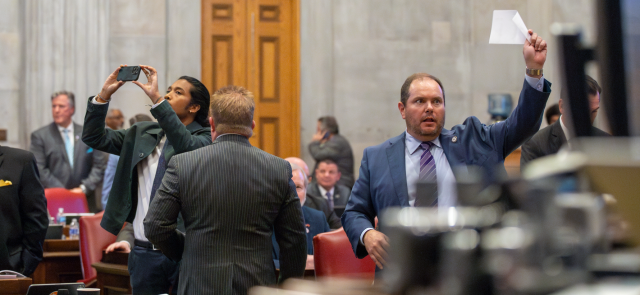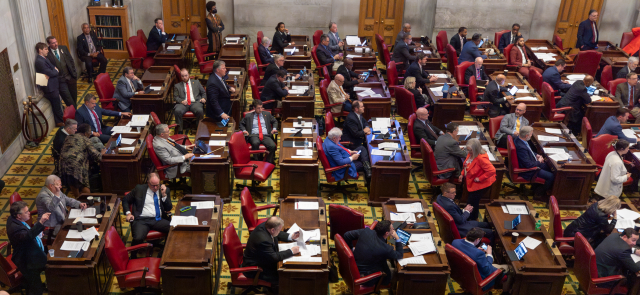Stay ahead of the curve as a political insider with deep policy analysis, daily briefings and policy-shaping tools.
Request a DemoACLU calls for Gov. Lee to veto for ‘unworkably vague’ abortion trafficking bill

Rep. Jason Zachary, R-Knoxville, attends a House floor session on Jan. 22, 2024. (Erik Schelzig)
The American Civil Liberties Union of Tennessee is urging Republican Gov. Bill Lee to veto an “abortion trafficking” bill that makes it a crime for anyone who “recruits, harbors or transports” a minor out-of-state to obtain an abortion without the consent of a parent or legal guardian.
“We need to protect the rights and well-being of Tennessee’s young people,” said Bryan Davidson, the Tennessee ACLU’s policy director, in a statement. He called on the Republican governor to veto the bill, charging that the bill’s passage was “politically motivated” and “not about making young people safer — they are about pushing abortion care out of reach.”
Lee’s office did not respond to a request for comment about the ACLU letter. The bill had yet to reach the governor’s desk as of mid-day Tuesday.
The measure initially sought to make violations a Class C felony punishable by six to 10 years in prison. But the bill was amended substantially in the Senate to reduce the punishment to a Class A misdemeanor, which is punishable by up to 364 days in jail and fines of up to $2,500.
During House debate, bill sponsor Jason Zachary, R-Knoxville said a couple he knew told him their 14-year-old daughter who was pregnant was “taken by what we assumed is a trusted adult, they’d been taken to Memphis, we just got a call from our doctor and they’re about to take her across state lines to get an abortion.”
Zachary said he had called the governor’s office in an unsuccessful effort to stop the girl from crossing state lines.
In his letter to Lee, the ACLU said the “bill harms young people’s ability to access the support of those they trust when they need it most and is an unprecedented attack on the First Amendment right to free speech and expression.”
Davidson said when abortion is restricted or banned, the impacts “fall hardest on those already facing unequal barriers to health care, especially young people, people with limited incomes, LGBTQ+ people, and Black and Brown people.”
While most teenagers who seek an abortion involve their parents, the legislation doesn’t account for “complicated family situations” that may make seeking parental consent for an abortion “unsafe or even impossible,” according to the letter.
The legislation also raises “several significant constitutional concerns,” Davidson said. The bill language is “unworkably vague,” he said, noting neither the bill nor state law defines the terms “recruits,” “harbors” or “transports” that are criminalized under the legislation, adding a bill sponsor said during debate that to “recruit” could include “just about anything.”
The legislation provides no help for pregnant teens in abusive family environments where the ACLU said disclosing pregnancy status may create a
risk of physical or psychological harm. Nor does it consider situations where a minor’s parent is absent or estranged to the point where obtaining notarized consent is not possible. These are not hypothetical scenarios but ”the harrowing realities of many pregnant young people across this state,” Davidson wrote.
The fiscal note for the amendment estimates the law would lead to 1.86 convictions per year.
The bill received final approval on votes on 74-24 in the House and 25-4 in the Senate.
Know the most important news affecting Tennessee
Get our free weekly newsletter that covers government, policy and politics that impact your everyday life—in 5 minutes or less.
Public records bill dropped in House as retribution for failure of unrelated measure
In the waning days of Tennessee lawmakers’ annual session last week, Senate Judiciary Committee Chair Todd Gardenhire got a bill passed unanimously in the upper chamber to prevent non-governmental third parties from intervening in public record lawsuits. But the sponsor of the companion bill decided against taking up the measure on the last day the …
Clear skies ahead? Tennessee governor signs ‘chemtrails’ ban into law
Republican Gov. Bill Lee has quietly signed a bill into law that sponsors say will prohibit the deployment of “chemtrails” over Tennessee. Officially, the measure sponsored by Rep. Monty Fritts, R-Kingston, and Sen. Steve Southerland, R-Morrison, is targeted at banning “geoengineering experiments by intentionally dispersing chemicals into the atmosphere.” But sponsors privately said the bill …
House, Senate war over franchise tax refunds expected to go to conference
The dispute between House and Senate Republicans over details in a $1.55 billion franchise tax refund bill for companies doing business in Tennessee is expected to go to a conference committee in hopes of ironing out so-far intractable differences between the chambers. Republican Gov. Bill Lee, administration officials and upper-chamber Republicans say the changes are …
Boro Grand Prix? IndyCar season finale’s move from downtown Nashville roils teams, sponsors
The Music City Grand Prix’s retreat to a racing oval in Wilson County is leaving many racing fans, teams and sponsors nonplussed. Unveiled to great fanfare as the season-ending event on the streets of Nashville, the event is instead being held at the Gladeville facility about 35 miles from downtown Nashville — or about 15 …




